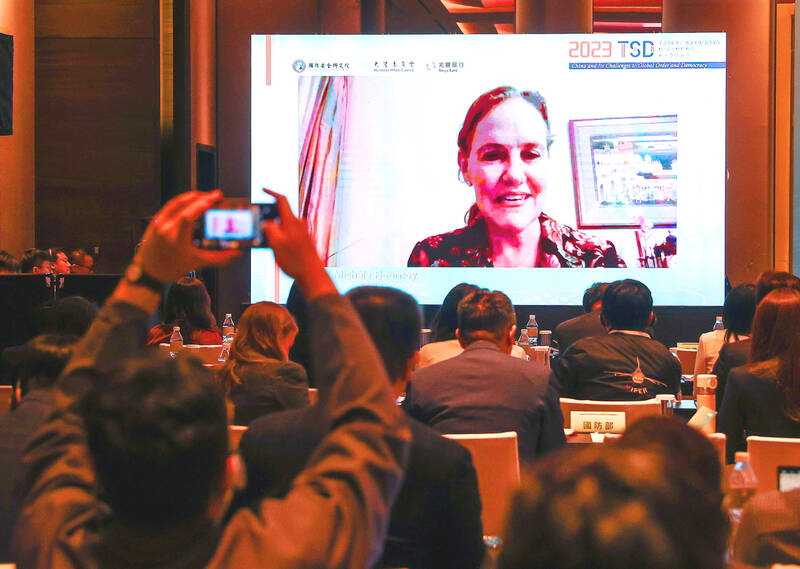A former US defense official yesterday called on Taiwan, the US and their allies to be prepared for “a moment in the late 2020s” when the Chinese People’s Liberation Army (PLA) might launch military operations against Taiwan.
Speaking virtually at a security conference in Taipei, Michele Flournoy, former undersecretary of defense for policy under former US president Barack Obama, said that the Indo-Pacific region is facing the rise of a “more assertive China.”
It is “trying to change some of those rules of the international order and to assert its will, as its economic and military power grows,” Flournoy said.

Photo: CNA
Increasing tensions between the US and China in the past few years were not because of a change in Washington’s policy, but a leadership change in the Chinese Communist Party from former Chinese president Hu Jintao (胡錦濤) to Chinese President Xi Jinping (習近平) in 2012, she said.
Under Hu and his predecessors, “China was very much internally focused on its own economic development, on bringing elements of its population out of poverty into the middle class, building its own economy,” she said.
However, with the arrival of Xi, China “dropped the mask or the veil” and “started to really flex its muscles economically, taking coercive measures against other countries militarily, building up its military,” she said.
Denial and deterrence are critical to preventing a potential US-China military conflict over Taiwan, she said.
Denial means convincing Xi that “he can’t be successful using military force to achieve his objectives,” while deterrence through cost and position means that “even if he could succeed, it would be at such great cost that it would be a Pyrrhic victory,” she said.
Xi is focused on economic and political coercion to shrink Taiwan’s international space and pressure it to change its posture, she said.
Xi has also instructed the PLA to continue its buildup to give him military options against Taiwan by 2027, she said.
“And so I believe we, the United States, our allies, Taiwan, the international community, we collectively need to be ready for a moment in the late [20]20s when deterrence may be tested,” Flournoy said. “And we need to be prepared for that and to be confident that President Xi, if he does test the waters of using force, that he will conclude that it’s too risky and too costly and he cannot succeed.”
Despite China’s military posture, Washington still needs to engage with Beijing due to shared interests and challenges and to reduce current level of tensions to stabilize the situation, she said.
Xi’s planned visit to the US for the APEC summit in San Francisco later this month to meet with US President Joe Biden could be a good start, she said.
“I don’t expect there to be any major policy changes on either side. I don’t expect more than somewhat symbolic deliverables, but I do think increasing dialogue, whether it’s restarting military-to-military dialogue or dialogue on arms control, on other issues, I think that’s very, very important,” she said.
Flournoy’s comments were made during a speech at this year’s Taipei Security Dialogue, organized by the government-funded Institute for National Defense and Security Research think tank.

An essay competition jointly organized by a local writing society and a publisher affiliated with the Chinese Communist Party (CCP) might have contravened the Act Governing Relations Between the People of the Taiwan Area and the Mainland Area (臺灣地區與大陸地區人民關係條例), the Mainland Affairs Council (MAC) said on Thursday. “In this case, the partner organization is clearly an agency under the CCP’s Fujian Provincial Committee,” MAC Deputy Minister and spokesperson Liang Wen-chieh (梁文傑) said at a news briefing in Taipei. “It also involves bringing Taiwanese students to China with all-expenses-paid arrangements to attend award ceremonies and camps,” Liang said. Those two “characteristics” are typically sufficient

A magnitude 5.9 earthquake that struck about 33km off the coast of Hualien City was the "main shock" in a series of quakes in the area, with aftershocks expected over the next three days, the Central Weather Administration (CWA) said yesterday. Prior to the magnitude 5.9 quake shaking most of Taiwan at 6:53pm yesterday, six other earthquakes stronger than a magnitude of 4, starting with a magnitude 5.5 quake at 6:09pm, occurred in the area. CWA Seismological Center Director Wu Chien-fu (吳健富) confirmed that the quakes were all part of the same series and that the magnitude 5.5 temblor was

The brilliant blue waters, thick foliage and bucolic atmosphere on this seemingly idyllic archipelago deep in the Pacific Ocean belie the key role it now plays in a titanic geopolitical struggle. Palau is again on the front line as China, and the US and its allies prepare their forces in an intensifying contest for control over the Asia-Pacific region. The democratic nation of just 17,000 people hosts US-controlled airstrips and soon-to-be-completed radar installations that the US military describes as “critical” to monitoring vast swathes of water and airspace. It is also a key piece of the second island chain, a string of

The Central Weather Administration has issued a heat alert for southeastern Taiwan, warning of temperatures as high as 36°C today, while alerting some coastal areas of strong winds later in the day. Kaohsiung’s Neimen District (內門) and Pingtung County’s Neipu Township (內埔) are under an orange heat alert, which warns of temperatures as high as 36°C for three consecutive days, the CWA said, citing southwest winds. The heat would also extend to Tainan’s Nansi (楠西) and Yujing (玉井) districts, as well as Pingtung’s Gaoshu (高樹), Yanpu (鹽埔) and Majia (瑪家) townships, it said, forecasting highs of up to 36°C in those areas